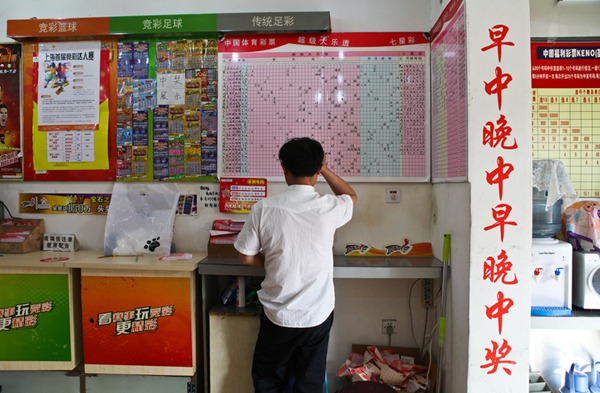Inquiries over the use of lottery revenue laudable
Updated: 2015-12-28 08:40
(China Daily)
|
|||||||||||
 |
|
A buyer studies winning numbers at a lottery shop, where a slogan reads "you will win sooner or later", in Shanghai in 2012.[Photo/CFP] |
It is good to know that the top legislators are "indignant" at the chaos surrounding government-run lottery revenues.
Even better to know that they are not just angry, but want to get to the bottom of what is going on.
At a special inquiry session on Saturday, a member of the National People's Congress Standing Committee reportedly grilled leaders of the Ministry of Civil Affairs and State General Administration of Sport, the two issuers of lottery tickets, with harsh questions about poor management and the abuse of lottery revenues.
People want lawmakers, at all levels, to do a lot more to live up to their name as "people's representatives". But what we heard about questioning on Saturday was a rarity.
Lawmaking has made impressive headway in China, but enforcement has lagged behind, leaving some well-thought-out legislation toothless.
Besides making laws, the People's Congresses' constitutional functions also include overseeing their implementation. In fairness to our national and local legislatures, People's Congresses, both national and local, have placed considerable more weight on oversight these years, but obviously still far from enough, especially when the pervasiveness of disregarding laws is taken into account.
Lottery revenues are only a tiny tip of an iceberg; but a revealing one. With gambling prohibited in China, lottery tickets are supposed to raise funds to finance social welfare and popular sports undertakings.
Yet nobody knew how much money was raised nor how the money was spent until the National Audit Office exposed the prevalent abuse of the revenues. Some of the money has found its way into issuers' pockets.
The lotteries are only one of many financial black holes fueling public suspicion. Many government agencies have their own skeletons in their closets. Family planning authorities have levied enormous sums of money through fines from people who violated child-bearing quotas, traffic and urban administration departments have garnered astronomical sums from fines and parking fees; the list goes on.
Despite repeated calls for transparency, little has been revealed about such revenues. Most authorities have chosen to play deaf and dumb. But the longer their silence lasts, the deeper they will sink in the mire of distrust.
What happened at Saturday's inquiry session was inspiring in that system insiders have felt an urge to speak up. That is good for preventing a full-blown credibility crisis. And the People's Congresses are in the best position to make that difference.
Related Stories
Migrant scores big win in lottery 2015-12-25 08:04
Largest lottery fever grips nation 2015-12-24 07:55
Investigation into and regulation of lottery operations necessary 2015-11-19 08:49
College criticized for assigning majors through lottery 2015-09-13 11:07
Lottery needs shake up 2015-06-29 07:50
Audit finds 25% of lottery funds were used illegally 2015-06-26 07:44
Today's Top News
Asian Infrastructure Investment Bank launched
Russia says it has proof of Turkey's support for IS
Investors adjusting expectations
India and Russia eye nuclear, helicopter deals
Chinese club offers lucrative contract to Spalletti
Germany is AIIB's largest non-regional shareholder
Spanish PM to form new govt after elections
Two-child policy expected to be approved
Hot Topics
Lunar probe , China growth forecasts, Emission rules get tougher, China seen through 'colored lens', International board,
Editor's Picks

|

|

|

|

|

|






